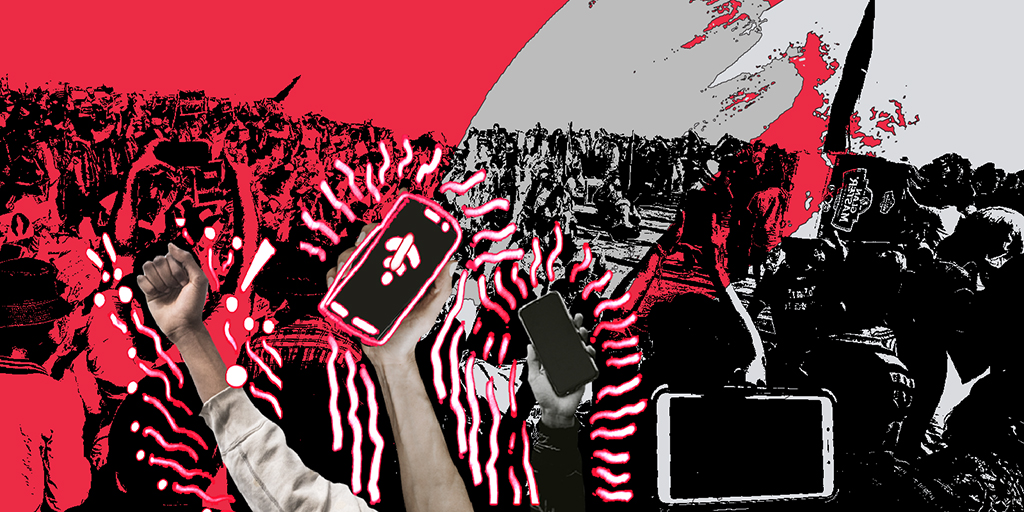This week, the second Summit for Democracy brought together over 120 national governments, civil society organizations, and businesses with the ambition of organizing “collective action to address emerging challenges to democracy.” One of the most pressing threats is shrinking space for civil society. If governments are serious about safeguarding democratic values – including respect for human rights – they must invest in and champion civil society, including digital civil society, as a voice that speaks truth to power.
Access Now has been engaged with the Summit for Democracy since last year, co-leading the Tech for Democracy cohort alongside the governments of the UK and Estonia. This has now grown into a coalition of over 150 civil society, government, and private sector actors in 40 countries, all focused on tackling specific threats and opportunities for fostering inclusive, digital participation in democracy. Within the context of this work, but also our wider work defending and extending human rights in the digital era, one thing is clear: civil society is under attack , under pressure, and underfunded.
Here are three areas that need special support from governments, international organizations, and business leaders if they wish to truly defend democracy.
- Don’t shut down the internet
For people to participate in democracy and stand up for their rights, they need free and fair access to information – and in the 21st century, this goes hand-in-hand with internet access and connectivity. But governments around the world continue to weaponize internet shutdowns, restricting freedom of speech and assembly, limiting electoral participation, and even jeopardizing people’s lives.
Ahead of this week’s Summit, Access Now contributed to and co-signed the Civil Society Declaration of Democratic Principles, which urges states to refrain from shutting down the internet or disrupting online communication services.
The #KeepItOn coalition continues to record a worrying rise in shutdowns worldwide; in 2022, there were 187 in 35 countries. Of these, 48 occurred in countries or regions with a documented record of human rights abuses, where cutting off the internet is a deliberate tactic to control the narrative and cover up atrocities.
Without free and fair access to the internet, civil society’s hands are tied when it comes to holding governments to account for their actions, while individuals are left disconnected and disenfranchised. States must commit to safeguarding internet access as a fundamental ingredient for democracy.
- Stop targeting civil society online
Activists, journalists, human rights defenders, and political opponents in authoritarian regimes, are deliberately targeted for online surveillance and harassment by state and non-state actors, as part of concerted efforts to silence, intimidate, and censor their work.
The Pegasus Project revelations showed the extent to which this occurs in democratic and authoritarian countries alike. The NSO Group’s Pegasus spyware has been used to target and surveil journalists, academics, activists, and human rights defenders in over 46 countries; from El Salvador to Greece, from Mexico to Thailand. Earlier this week, following pressure from civil society, the Biden Administration barred U.S. federal agencies from using commercial spyware unless they meet stringent requirements – a significant step forward in recognizing how such technologies threaten human rights. Now the world must follow suit, in enacting a global moratorium on the export, sale, transfer, servicing, and use of targeted digital surveillance technologies, until rigorous legal and practical safeguards are in place.
We also see how the people most in need of having their voices heard, and those championing them, are the most vulnerable to relentless online attacks – attacks which have real, sometimes deadly, consequences. Women journalists are increasingly targeted by gender-based online violence: women’s rights activists are doxxed and harassed based on information obtained using spyware, and LGBTQ+ people are entrapped and persecuted because of their activity on social media. For democracy to be fully inclusive, those in power within governments and businesses must safeguard the digital rights of every individual, but especially at-risk people and communities.
- Don’t abuse digital regulations to curtail human rights
Digital technologies have created new legal challenges, which often warrant new regulations. But in many countries, this is being used as an excuse to curtail, rather than safeguard, fundamental human rights. In Tunisia, a new decree law intended to fight cybercrime will limit press freedom, while Iraq’s draft regulation for online platforms could hugely curtail freedom of expression. Meanwhile, Myanmar’s military regime is pushing through a notoriously oppressive, rights-infringing cybersecurity law that will close all avenues for online dissent and expression, and embolden the junta’s digital dictatorship.
Too often, we see rules allegedly intended to protect people in the digital age, or introduced with vague justifications such as “national security,” infringing human rights. Democratic governments must push back against this insidious mission creep, ensuring that the impact on human rights, especially for at-risk people and communities, is always the first consideration before implementing any new digital rules and regulations.
Civil society is sometimes called a foundational building block of democracy, but it is also the last line of defense before a descent into the abyss of authoritarianism. We should be recognized and supported as such. Democracy dies without room for participation, dissent, and debate – and in the digital age, governments must protect civic space and civil society online, as much as in the streets, column inches, or halls of power.
